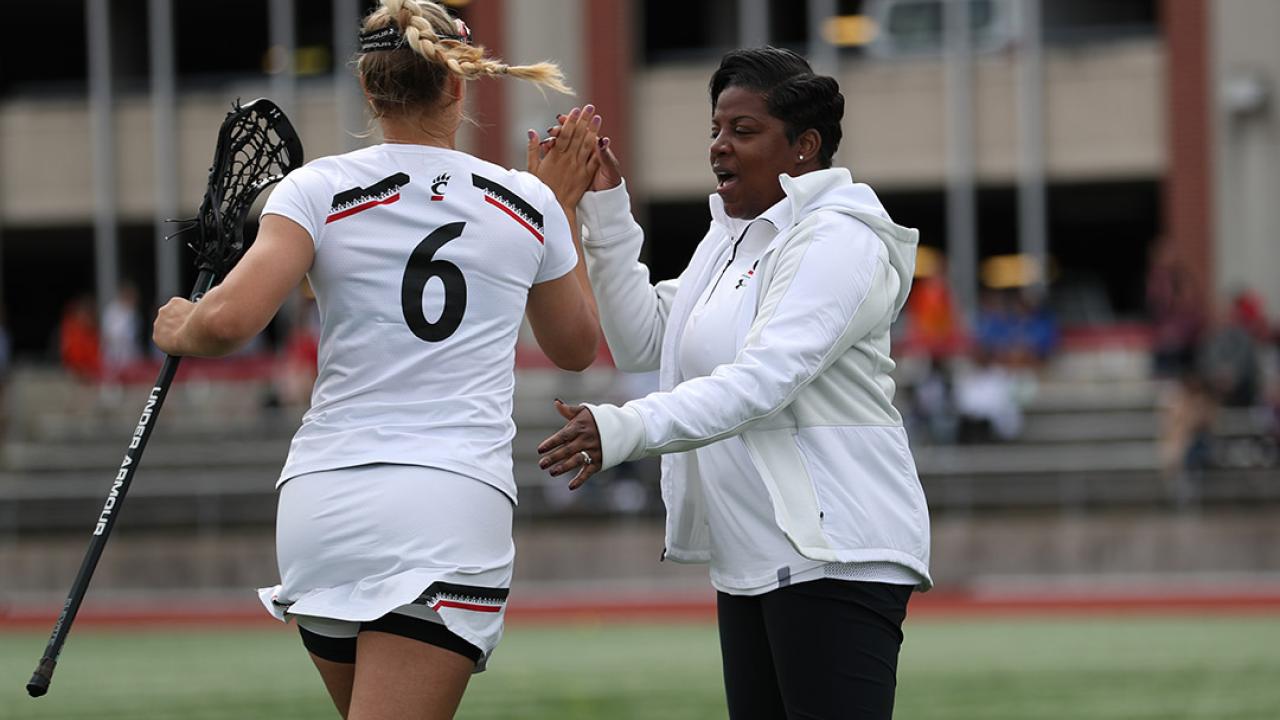
Conversations of Race in College Lacrosse: The Responsibility of a Coach
Nearly a week after the death of George Floyd, Gina (Oliver) Thomas still hadn’t watched the graphic video that showed a police officer kneeling on his neck for almost nine minutes.
She needed to stay calm and composed, given her platform in the game of lacrosse. Plus, she didn’t need another instance of racial injustice to prove that there is an issue in the United States of America.
“It was better for me to control my emotions by not watching the video,” she said. “It’s bigger than that situation. Why did George Floyd’s murder get us to where we are now? This happened for the umpteenth time.”
She immediately thought of her two nephews, who have been pulled over by police, and her husband, a business owner who has been out late at night for work. The anxiety that she felt about the death of Floyd manifested itself in the fear she has for her own family.
“It’s always in the back of my head, so I just cross my fingers and hope nothing happens,” she said.
The head coach of Cincinnati and former U.S. women’s national team gold medalist knows she now has a platform both as a player and a coach. In addition to controlling her own emotions, which ranged from anger to anxiety after hearing about Floyd’s film, she plays a role in leading her team and fostering her newborn son, Aaron Thomas Jr.
Being an African American woman in lacrosse, Thomas is one of a select few who have ascended to the sport’s highest level. Now leading a Division I program, she hopes to continue to foster an environment in which everyone can succeed.
“It’s sparking conversations and actually educating each other about experiences and being vulnerable to each other about how we feel and what we’re thinking,” she said. “It’s not just, ‘How does it feel to keep diversity in the women’s lacrosse game?’ But also, how does it feel to be a white teammate of someone who is black? Let’s not make it difficult for people to open up and ask questions.”
She is not alone, as coaches around the game are engaging with their respective teams on what it means to be black in this sport and what teammates can do to help make programs more inclusive.
The events surrounding Floyd’s death have generated plenty of lively discussion among college programs, both in the men’s and women’s games.
Kristen Carr, an assistant at Ohio State and a fellow member of the 2013 U.S. gold medal team, said coaches have a responsibility to kickstart the honest discussions among their team as a stepping stone for progress.
Two Buckeyes players and an athletic trainer, all of whom are black, held a Zoom call with the rest of the team to talk about their experiences.
“You’ve got to start [the conversation],” she said. “For us at Ohio State, that’s where it’s been so moving to have had these conversations with our team already and just build off those conversations. Be curious about other peoples’ lives, not just your own. We come from such different backgrounds, and with any team you’re on or managing, those diverse experiences encourage out-of-the-box thinking.”
Nick Myers, the U.S. U19 and Ohio State men’s head coach, had two former captains, Dominique Alexander and Bryce Woodson, speak to his team about race in lacrosse.
Both Woodson, the US Lacrosse Midwest regional manager, and Alexander are black and offered their experiences to a predominantly white team. Myers also had his team watch the Netflix documentary “13” to help provide more context to the current climate of racial injustice. Myers will meet with his team Tuesday night on Zoom to discuss the film.
Even though he may not be able to relate to his black players on all levels, Myers is committed to making sure his team understands the issues that our nation is facing. He’s also giving his team off on Election Day and set a goal to have 100 percent participation.
“I think the biggest thing is that you take the time to listen, educate yourself around the social injustices that exist and have for a long, long time, and just make sure that your men know that you have their back,” he said. “Today, tomorrow and certainly for as long as I’m the head coach here at Ohio State, we’re going to continue to make sure this is a priority to be as inclusive a locker room as we can be.”
Actions like that from coaches of all types may help put an end to what Thomas called “microaggressions” in the sport of lacrosse. The microaggressions have caught the attention of the lacrosse world over the past few years — incidents like the Virginia Tech women’s lacrosse team coming under scrutiny after a video surfaced of members singing a song that included the n-word, and more recently, an incident that involved Amherst men’s lacrosse players shouting racial slurs toward a black teammate’s suite, leading to the firing of head coach Jon Thompson.
Microaggressions are nothing new to the Pottstown, Pa. native. She was one of the only black players on her teams growing up. She had to explain to her black friends that although she was playing a predominantly white sport, she was still “black.” She said to explain her background, hairstyle and other cultural norms to her white teammates.
At times, she said she felt like a “commodity.” As her platform continued to grow and she made it to the U.S. national team, she was continually asked about her skin color, and the lack of black women in the game.
Through mentors like Tina Sloan Green, the first African American coach of the U.S. women’s national team, and fellow star Cherie Greer Brown, Thomas developed her platform. Now with a different platform, she wants to make sure her players are embracing teammates for who they are, not just their skin color.
She’s hoping for a world in which black players don’t feel as isolated.
“Can it just be me playing sports?” she questioned. “I’m just tired of having to answer the question, ‘How does it feel being the only black player on the team?’ I’m over answering that question.”
Matt Hamilton and Kenny DeJohn
Sample description for these two <a href="https://twitter.com/USALacrosseMag" target=new>Follow on X</a>

Categories
Tags
Related Articles




